His Beatitude Metropolitan Sawa of Warsaw and All Poland and the entire episcopate of the Polish Orthodox Church have shown themselves to be among the most ardent supporters of His Beatitude Metropolitan Onuphry of Kiev and All Ukraine and the canonical Ukrainian Orthodox Church as the autocephaly crisis led by the Patriarchate of Constantinople continues to unfold.
In May, the Synod of the Polish Church stressed the need for repentance from the Ukrainian schismatics before admitting them back into the Church and for a pan-Orthodox discussion on the provision of autocephaly (neither of which happened); in late September, Met. Sawa personally renewed the call for Pat. Bartholomew to convene a pan-Orthodox council to resolve the Ukrainian crisis, as have many several Synods, primates, and hierarchs; on November 16, the Bishops’ Council of the Polish Church adopted a resolution by which Polish clergy are forbidden to have liturgical or prayerful communion with representatives of the schismatic “Kiev Patriarchate” or the schismatic “Ukrainian Autocephalous Orthodox Church”—the two groups that united into the new schismatic “Orthodox Church of Ukraine” on December 15; Met. Sawa wrote a personal letter of support to Met. Onuphry in mid-December following the scandalous “unification council,” which, in the eyes of Constantinople, removed Met. Onuphry as the canonical Metropolitan of Kiev; and finally, Met. Sawa specifically rejected Pat. Bartholomew's request that he recognize the new Ukrainian structure and commemorate its primate, “Metropolitan” Epiphany Dumenko, at the Divine Liturgy, saying that Pat. Bartholomew has acted uncanonically and that the Ukrainian schismatics have no grace of ordination.
In the interview below, His Beatitude Met. Sawa further explains the Polish Church's position.
***
—Your Beatitude, did you send wishes and greetings to the new metropolitan of Kiev Epiphany?
—No, I did not. Great harm was done to this young layman, having been appointed metropolitan. In light of canon law, he is not a clergyman. He was not ordained by a canonical Orthodox Church.
—As I understand it, Your Beatitude, you are against autocephaly for the Ukrainian Orthodox Church?
—No, not at all. The press sometimes fabricates such provocative things. I believe that every nation has the right to its own Church. From the very beginning, when the question of autocephaly for Ukraine appeared, I was for it, but on the terms adopted in our Orthodox law.
—What does that mean? By a different way than that proposed by Constantinople?
—According to our canons, a suspension is removed by whoever imposed it. The Ukrainian schismatics who created the Kiev Patriarchate and autocephaly were excluded by the Moscow Patriarchate twenty years ago, and only it has the right to restore them to the bosom of the Church, not Patriarch Bartholomew of Constantinople—of course, under the condition that the schismatics repent and offer penance. Later they can be ordained and together create an autocephalous Church in Ukraine.
—But that’s unrealistic today.
—Unfortunately, that is probably so. Things have really gone too far. It’s all pride, the pride of Philaret, who was used by the first President of Ukraine Leonid Kravchuk. More and more I think this matter is in God’s hands alone. Otherwise, we’ll never get out of this situation created by satan. I am convinced that the Ukrainian authorities should first unite the country and end the war, and only then take up Church matters. Big changes are needed there. In Poland, we have a legally regulated relationship with the state—the Catholic church has its concordat, and we have our statutes that regulate property matters. In Ukraine, everything after the communist regime is in the hands of the state—it can even deprive the Church of its registration. The main thing, however, is that the Church be created by the unification of the faithful. They should decide which church they want to belong to. There is no such unity today in Ukraine.
—Ukrainians believe that the Ukrainian Orthodox Church of the Moscow Patriarchate supports the annexation of Crimea and the war in eastern Ukraine. Is that not enough of a reason to separate from it?
—These are political matters. I don’t deal with that.
—Your Beatitude, was your position regarding Ukrainian autocephaly worked out in consultation with the Moscow Patriarchate?
—Our position does not depend on Moscow. We take it ourselves on the basis of Orthodox dogma and canons. That’s the most important thing for us.
—On January 6, Patriarch Bartholomew will hand a tomos to Metropolitan Epiphany of Kiev,1 establishing a legal, independent Orthodox church in Ukraine. What’s next?
—I advise him not to do it. And not just me—the Patriarch of Antioch suggested convening an Orthodox Church council as soon as possible to discuss the situation in Ukraine and find a canonical solution to the problem. It would be best to delay the granting of the tomos to Ukraine and to bring the matter together in a pan-Orthodox decision.
—So gather together, and what? Is there some kind of plan?
—I think Patriarch Kirill is also ready for dialogue. His latest letter to Patriarch Bartholomew testifies to that. At least that’s how I read it. First of all, Moscow, Constantinople, and Kiev should talk about it. If they find a solution, we’ll accept it.
—And if Patriarch Bartholomew doesn’t postpone anything but fulfills his plan, what will happen?
—There will be chaos, as there is now. I greatly appreciate Patriarch Bartholomew, I really love him, but he has found himself, by his own desire, in a very difficult situation; he is pressured from various sides. He probably has no other choice now but to issue a tomos to Ukraine.
—Will it be unfavorable for the Polish Orthodox Church?
—I’ve already spoken about canon law. Violating it is a bad precedent. We can’t rule out that in Poland, where more than a million Ukrainians live, a group of believers will appear for whom Philaret will try to organize his parishes in Poland. I recently heard that Right Sector2 has already looked into the possibility of Epiphany visiting Poland. Chaos awaits us.3

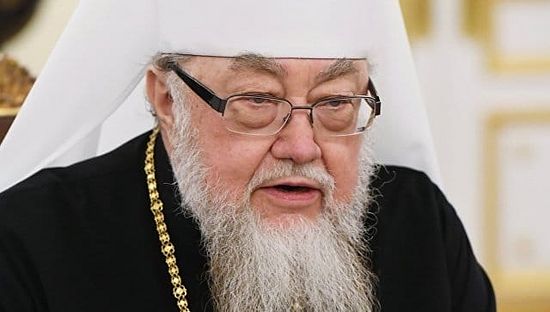
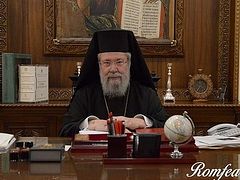
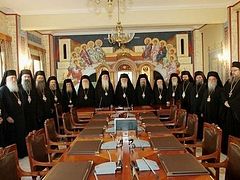
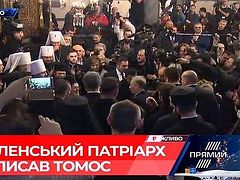
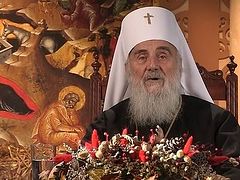
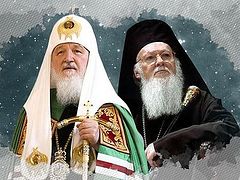
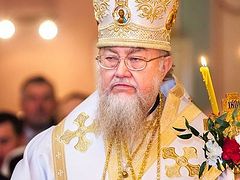
His sanity, philotimo, and defense of the Orthodox Tradition are beautiful to see. I am grateful to this site. .
It is very sad to consider even the possibility that the Patriarch of Jerusalem would yield to secular pressure about concelebrating with the schismatic Ukrainian Church, along with the likelihood that the Ecumenical Patriarch has done so. How then are we as lay people expected to resist such pressure in our lives if our Shepherds do not lead the way? May God grant our hierarchs grace, wisdom and courage to honor and respect our Tradition, Canons, one another, and thus our Lord.